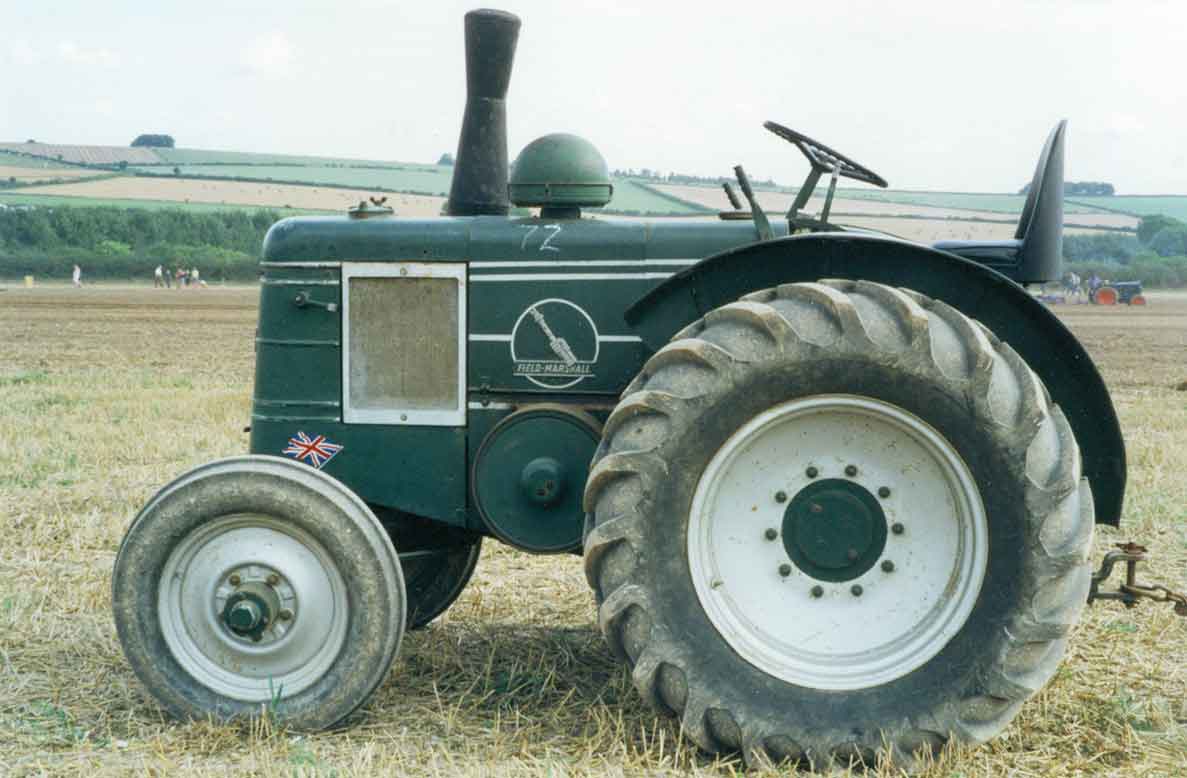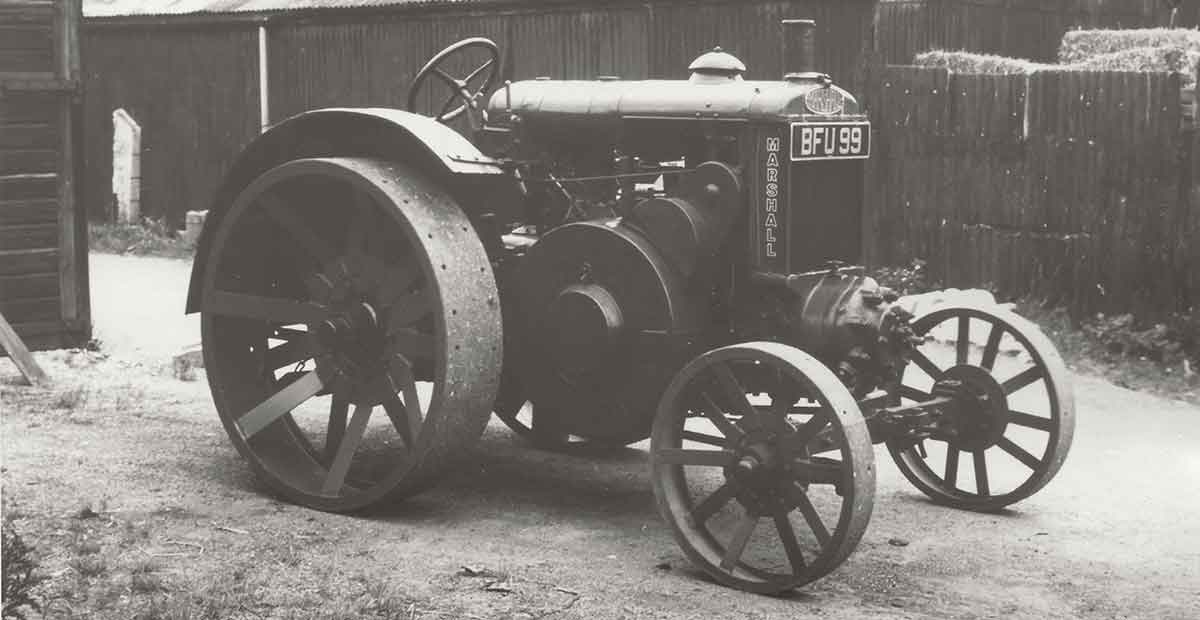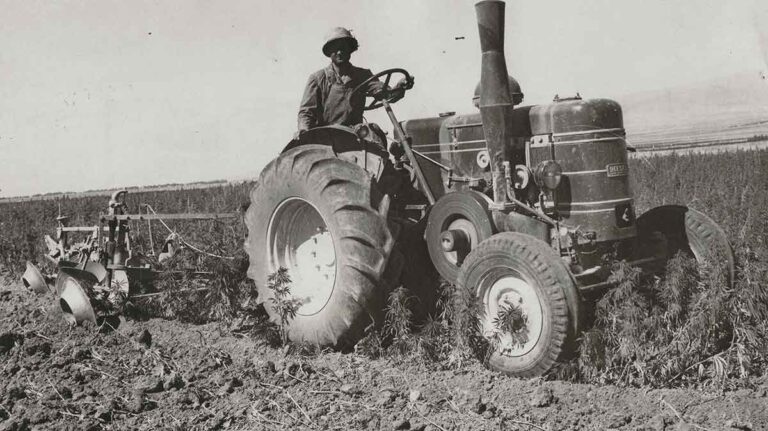The Marshall company’s impressive contribution to power farming history includes a range of internationally successful steam engines, plus a long-running tractor series with an unusual engine design.
The company’s history began in 1848 when William Marshall started a small engineering and blacksmiths business in Gainsborough, Lincolnshire.
Rapid expansion included an order from Russia to supply railway equipment when the company was less than 10 years old, but agricultural equipment provided most of the growth with products including threshing machines and steam engines, which were exported in large numbers.
See also: Whatever happened to…John Deere Model A?
By the early 1900s, tractors were starting to challenge the supremacy of steam for power farming, and Marshall began tractor production in 1908, making the large ‘Colonial’ models designed mainly for export.
These achieved some success in countries with big farms, such as Australia and Canada, and the success included a first prize plus a gold medal in Canada’s leading tractor competitions, where most of the entries came from American companies that were considered to be world leaders in large tractor design.
Smaller tractor
The next stage in Marshall’s tractor development came in the mid-1920s with an ambitious programme to develop a smaller tractor with wider sales appeal, resulting in the Model E or 15/30, available from 1930.
At a time when spark ignition engines still dominated the tractor market, usually with four vertical cylinders, Marshall chose a two-stroke diesel engine with a single horizontal cylinder.
The 15/30 was the first in a series of Marshall models powered by this type of engine, which was available until 1956.
Marshall’s engine choice may have been prompted by the success of the single-cylinder Lanz Bulldog tractor series in Germany, but a significant difference was the fact that the Bulldog engine was a semi-diesel with hot-bulb starting, while the Marshall engine was a full diesel.
The piston bore was 8in with 10.5in stroke and the 15/30 model number indicated the rated output at the drawbar and at the flywheel. The power was developed at a leisurely 550rpm and was delivered through a three-speed gearbox with a 5mph maximum.
Sales features emphasised by Marshall included a reduction in fuel costs compared with a petrol/paraffin tractor, helping to offset some of the 15/30 price premium.

Reliability issues
Although the 15/30 attracted considerable interest, there were some reliability issues and it was replaced after less than two years by the updated 18/30, so named to reflect a small increase in power output.
Various design problems that arose with the 15/30 appeared to have been resolved on the improved version, which remained in production until 1937.
While Marshall was developing its tractor business, the company was facing increasingly serious financial difficulties.
These were caused partly by a general reduction in farming profitability that was affecting equipment sales in the UK and some export markets, but the biggest problem for Marshall was the almost total loss of the steam engine sales that had produced most of the previous profits.
In 1935 the receiver was called in, and during the following year the Sheffield-based Thomas W Ward company bought the remaining Marshall assets and injected capital to enable the business to continue trading.
The financial support enabled Marshall to continue developing a new model to replace the 18/30 tractor.
Weight reduction
The aim was to attract more customers by reducing the weight and the production cost compared with the 18/30, and the result was the Marshall 12/20, available from 1936.
Engine modifications included reducing the bore and stroke dimensions to 6.5in and 9in and the engine speed was increased to 700rpm maximum.
The 12/20 was replaced in 1938 by an updated but basically similar tractor called the Model M, which offered a modest power increase but was similar in appearance to the 12/20.
While Model M production continued during World War 2, the Marshall company was working on the design for its replacement, with the first deliveries of the new model starting as the war was ending.
The new tractor was the Mark 1 version of the Field Marshall, a name probably reflecting the increased level of interest in military matters during and just after the war.
Although the new model looked quite different with more rounded styling, in mechanical terms it was an updated Model M, and this included the engine.

The single-cylinder engine used in the new Field Marshall was a direct descendant of the 15/30 power unit. It was also similar to the Model M engine, but with extra rpm available to provide a modest power boost.
Engine starting on the earlier single-cylinder Marshalls was assisted by using a device to reduce the engine compression, while a special smouldering ignition paper was inserted to encourage the engine to start.
An improved starting system introduced on the post-war Field Marshall and the models that followed used a special starting cartridge to produce a small explosion in the combustion chamber to encourage the engine to start.
Popular choice
The power characteristics of the single-cylinder diesel engine made Marshall tractors a popular choice for stationary work such as powering a saw or a threshing machine.
This helped to attract some specialist contractors, and Marshall offered a contractor version of the Mark 1 tractor with special equipment, and later versions of the Field Marshall were also available with contractor specifications.
Marshall replaced the Field Marshall Mark 1 in 1947 when the Series 2 arrived with the output increased to 40hp, and later the Series 3 tractor available from 1950, also with a 40hp engine.
An important development on the Field Marshall Mark 3 was the addition of a hydraulically operated three-point linkage.
The single-cylinder Marshall series reached its final stage in 1952 when the Mark 3 model was replaced by the Series 3A, which was given a completely new look when the paint finish was changed from dark green to a bright shade of orange.
Marshall had already realised its distinctive engine design was becoming outdated, and introduced the MP4 tractor, powered by a four-stroke diesel engine with four cylinders in 1954, but there were still some customers in the UK and in a number of export markets who liked the single-cylinder models, and the 3A remained in production until 1956.


